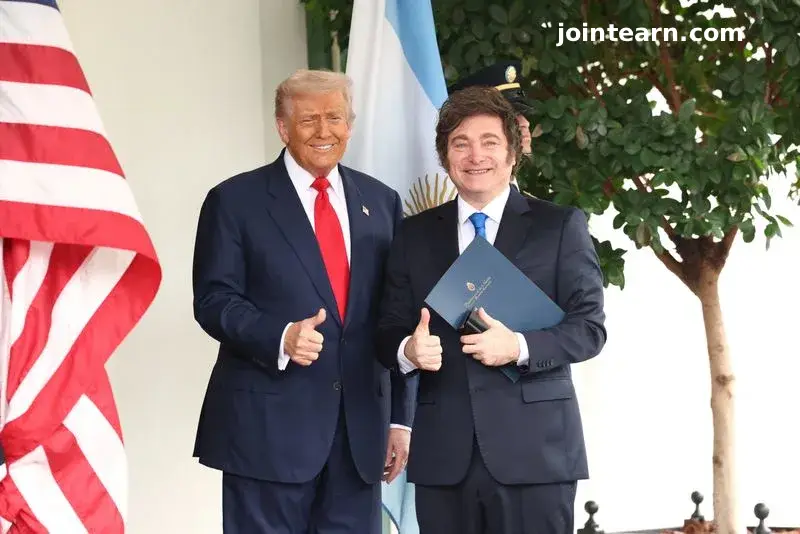
In a bold statement that could reshape Argentina’s political and economic outlook, U.S. President Donald Trump declared on Tuesday that continued American support for Argentina’s government depends on the success of President Javier Milei’s ruling party in the upcoming midterm elections.
Trump, speaking alongside Milei at the White House, stated, “We’re not going to waste our time” if the libertarian Argentine leader fails to secure parliamentary backing in this month’s critical vote.
The meeting comes only days after Washington unveiled a major $20 billion financial support package aimed at stabilizing Argentina’s volatile economy — a move that initially lifted markets but has since sparked uncertainty following Trump’s conditional remarks.
U.S. Ties Argentina’s Economic Aid to Milei’s Political Future
President Trump expressed strong personal admiration for Milei, calling him “a man with the right philosophy,” but cautioned that U.S. support is not unconditional.
“If he wins, we’re staying with him. And if he doesn’t win, we’re gone,” Trump said before a luncheon with Milei and senior cabinet members.
The comments triggered an immediate reaction in Argentina’s financial markets. The Buenos Aires stock exchange reversed earlier gains and fell by around 2%, reflecting investor concern that Washington could withdraw support if Milei’s party underperforms in the midterms.
Inside the $20 Billion U.S. Financial Lifeline
The recently announced U.S. package, spearheaded by Treasury Secretary Scott Bessent, centers on a currency swap agreement with Argentina’s central bank. Under the plan, U.S. dollars will be exchanged for Argentine pesos, helping stabilize the country’s reserves and protect the peso from further devaluation.
Bessent emphasized that the program’s continuation is tied to Milei’s economic reform agenda, including aggressive spending cuts and deregulation efforts.
“Going back to Peronist policies would cause a rethink,” Bessent said, referencing Argentina’s traditional populist approach.
Despite speculation, Bessent clarified that the U.S. financial assistance is not contingent on ending Argentina’s swap line with China, allowing Buenos Aires to maintain its existing economic ties with Beijing.
Milei’s Economic Overhaul and Political Challenges
Since taking office, Javier Milei has implemented sweeping austerity measures to curb Argentina’s long-standing fiscal deficit. His “chainsaw plan” — a nod to his campaign symbol — has led to massive public sector job cuts and the creation of a Deregulation Ministry to promote competition across key industries.
The libertarian leader’s radical economic policies have polarized Argentines. Supporters view his partnership with Washington as a necessary step toward long-term recovery, while critics warn it risks deepening inequality and dependency on foreign powers.
“No country grows on its own, without outside help,” said Kevin Nehuen, a 24-year-old Milei supporter from Neuquen, who attended the president’s recent book launch in Buenos Aires.
Domestic and International Reactions
Trump’s remarks have also stirred controversy within the United States. Some Democratic lawmakers accused the administration of prioritizing foreign bailouts over domestic concerns, particularly amid a government shutdown.
Meanwhile, American farmers voiced frustration over China shifting soybean imports to Argentina, citing the deal as favoring foreign competitors.
In Argentina, the opposition has seized on Trump’s statement as evidence of Milei’s overreliance on U.S. backing. Former President Cristina Fernández de Kirchner, serving a corruption sentence, criticized the agreement as “food for today and hunger for tomorrow,” warning it could leave Argentina vulnerable to external pressures.
A High-Stakes Political Test
Milei faces a crucial midterm election on October 26, which will determine whether his coalition retains enough power to continue enacting reforms. His approval ratings have slipped amid inflation concerns and rising unemployment, heightening the importance of U.S. support.
Analysts say maintaining a stable exchange rate and preventing a peso collapse will be key to his political survival.
“It benefits the government to reach the election with a stable exchange rate and without draining reserves,” said Ignacio Labaqui, a political analyst in Buenos Aires.
If Milei’s party performs well, the U.S. partnership could strengthen, unlocking further investment and trade advantages. But a loss could jeopardize both the financial lifeline and the broader U.S.-Argentina relationship.
Trump and Milei: A Political Alliance Built on Ideology
President Trump has openly described Milei as his “favorite president” and a model for conservative leadership in Latin America. The two leaders share similar populist and free-market ideologies, emphasizing deregulation, state reduction, and strong nationalist rhetoric.
Milei was one of only two foreign leaders to share the stage during Trump’s inauguration — a gesture symbolizing a deep personal and political connection that has now evolved into a strategic economic partnership.
Meta Description (for SEO)
U.S. President Donald Trump warns that American support for Argentina will depend on President Javier Milei’s success in the 2025 midterm elections. The two leaders discussed a $20 billion financial package and deepening economic ties amid Argentina’s economic crisis.


Leave a Reply